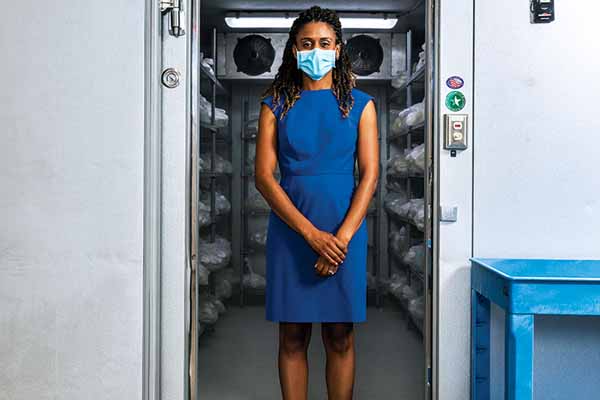
Pediatrician Danielle Arnold, MD, was looking for a way to give the family medicine residents at Baylor Scott and White Medical Center – Round Rock a first-hand look at the health benefits of breast milk for preterm and medically fragile newborns.
“I wanted them to understand how to support breastfeeding moms. So I thought, ‘What better way to expose them to how important breast milk is than to send them to Mothers’ Milk Bank in Austin?’”
Those visits soon turned into discussions with the nonprofit’s leadership about how she could get involved, which led to Dr. Arnold joining the board of directors in January.
Mothers’ Milk Bank at Austin is one of 24 nonprofit milk banks in the U.S. that serve 199 hospitals in 23 states, including Texas. In 2018, it provided 775,000 ounces of donor milk, mostly to hospitalized infants, Dr. Arnold said.
“Women who are healthy and have infants less than 1 year go through an easy minimum four-day screening process, all expenses covered,” she said. “After medical and lifestyle screening, and blood work, they can drop off milk at the milk bank or more than 50 collection sites in Texas and elsewhere. That milk is tested bacteriologically and nutritionally, pooled, pasteurized, and dispensed to mostly medically fragile infants.”
Texas Medicine spoke to Dr. Arnold recently about breast milk and the Mothers’ Milk Bank in Austin.
Explain some of the health benefits of breast milk.
We know that breastfeeding is best for all babies, but for babies who are preterm and very small – small enough to fit in the palm of your hand – it can be life-saving. For example, it can protect against one of the most dangerous medical conditions that affect preterm babies, called necrotizing enterocolitis. We don’t know of any other way to prevent NEC, but if babies get it, it can be life-threatening or really change the course of their lives.
How have attitudes and understanding of the benefits of breast milk changed over the years?
As physicians, we understand the health benefits of breast milk. But I think we haven’t caught up yet with the practical piece to really support breastfeeding mothers. We need to ensure mothers can get in touch with a lactation consultant. We need to ensure that mothers understand that many insurance plans will cover visits with a lactation consultant. We need to be equipped to talk about how to pump and store breastmilk when mothers return to work or school.
What changes do you see moving forward?
One of the next steps forward is for every NICU (neonatal intensive care unit) that serves very small and medically fragile babies to offer donor human milk. You’d think every one of them would have donor breast milk, but that’s still not true. Seeing those resources being employed in every high-level NICU is where we need to go.
What else can be done to increase its availability?
Access requires both milk and financial contributions. We’re going to have to do more reaching out to potential milk donors. I wish that every mother knew that they have the opportunity to save another baby’s life – if they have breastmilk beyond their own baby’s needs, they should call, email, or sign up on the website to begin the screening process.
The milk bank is determined to change health disparities, especially the fact that black women’s babies often don’t get the benefit of breastmilk. We don’t know all the reasons why, but we think it’s because they don’t have the same supports in place, including ways to pump when they return to work. If we’re going to offer breastmilk to all of the babies that need it the most, we have to make sure we keep equity in mind.
What advice would you give your colleagues who are considering getting involved in a nonprofit?
You can make a small impact by volunteering once a quarter; that will be fulfilling, and it’s going to be a great experience for you and a great benefit to the public. But being able to contribute your specific experience and to guide the direction of a nonprofit is exciting. You really get to use your expertise that wouldn’t get tapped into otherwise. If you have a passion for something, it’s a great way to give back.
Tex Med. 2019;115(9):6-7
September 2019 Texas Medicine Contents
Texas Medicine Main Page